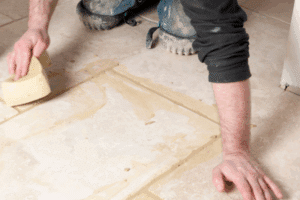Choosing the best grout can make or break the look of your tile project. Many homeowners in Birmingham spend hours picking the perfect tile but overlook the grout, only to end up with cracks, stains, or uneven lines. If you’ve been frustrated with grout that doesn’t hold up or match your style, you’re not alone.
The good news? By learning about the different grout options and where they work best, you’ll be able to make a choice that keeps your tile beautiful and durable for years.
Why Grout Choice Matters

Grout does more than just fill the gaps between tiles. It seals edges, prevents water damage, and ensures tiles stay in place. In a humid city like Birmingham, the wrong grout choice can lead to mold, discoloration, or crumbling joints.
The right grout, on the other hand, protects your investment while elevating the look of your floors, showers, or backsplashes.
Types of Grout to Consider
Sanded Grout
Sanded grout is mixed with fine sand particles, making it more durable and resistant to shrinking. It’s ideal for wider joints (⅛ inch or more), such as floor tiles, where strength is key. Homeowners love it for its affordability and toughness, though it can be harder to clean in textured tiles.
It also comes in a wide variety of colors, so you can easily match or contrast with your tiles. With proper sealing, sanded grout can last for many years, even in high-traffic areas.
Unsanded Grout
Unsanded grout is smooth and sticky, perfect for thin grout lines (less than ⅛ inch). It’s often used on walls, countertops, and delicate tile surfaces like marble that could be scratched with sanded grout. While it provides a sleek look, it’s not as strong for heavy-traffic areas. It’s also easier to apply to vertical surfaces because it doesn’t slump or slide out of place.
Many Birmingham homeowners choose it when aiming for a clean, seamless finish in smaller spaces.
Epoxy Grout
Epoxy grout is known as one of the best grout options for high-moisture areas like bathrooms and kitchens. It resists stains, chemicals, and water much better than traditional cement-based grouts. Though it’s pricier and trickier to install, its long-lasting performance makes it worth the investment. Because it doesn’t require sealing, maintenance is much simpler compared to other types.
Its durability makes it a top choice for families who want beauty and practicality in one.
Furan Grout
Less common in residential projects, furan grout is highly resistant to chemicals and extreme conditions. It’s usually reserved for industrial settings, but it may be recommended in certain commercial projects in Birmingham. This type of grout is made with polymers that can withstand very harsh environments.
While you may not need it at home, it’s valuable for businesses that deal with constant exposure to strong chemicals.
How to Choose the Best Grout for Your Tile Project
Selecting the best grout depends on your tile type, room conditions, and lifestyle. Ask yourself:
- Where will the tile be installed? Floors, walls, showers, and outdoor areas all have different needs. A durable option like sanded or epoxy grout is often best for high-traffic spaces.
- How much moisture is present? Bathrooms and kitchens demand grout with better water resistance. Choosing the right grout here can prevent costly repairs from water damage later.
- What style are you going for? Contrasting grout colors can make tiles pop, while matching tones creates a seamless look. Your choice of grout color can completely change the mood of a room.
- How much maintenance are you willing to do? Epoxy grout requires less upkeep, while cement-based grout may need sealing and cleaning of porcelain tile regularly. Think about how much time you want to spend on cleaning and resealing in the future.
By weighing these factors, you’ll avoid common headaches like cracking, staining, or premature wear.
Tips for Maintaining Grout
Even if you choose the best grout, regular care will keep it looking fresh. Here are a few tips:
- Seal cement-based grout to protect against stains and moisture, following best practices for tile sealers.
- Clean spills quickly to prevent discoloration.
- Use a grout-safe cleaner instead of harsh chemicals that can erode the surface.
- Inspect annually for cracks or gaps and repair them before they worsen.
Conclusion
Choosing the best grout for your tile project in Birmingham may seem like a small detail, but it can make a big difference in durability, appearance, and long-term maintenance. From sanded and unsanded to epoxy and specialty grouts, each type has its own advantages depending on your tile, room, and lifestyle.
When in doubt, ask a professional tile installer for guidance. They can recommend the right grout for your specific project, help prevent costly mistakes, and ensure your tiles look beautiful and last for years to come.

